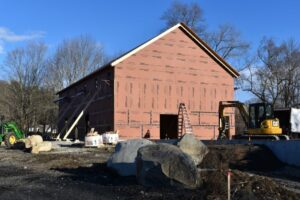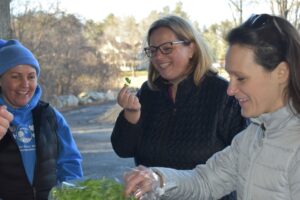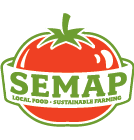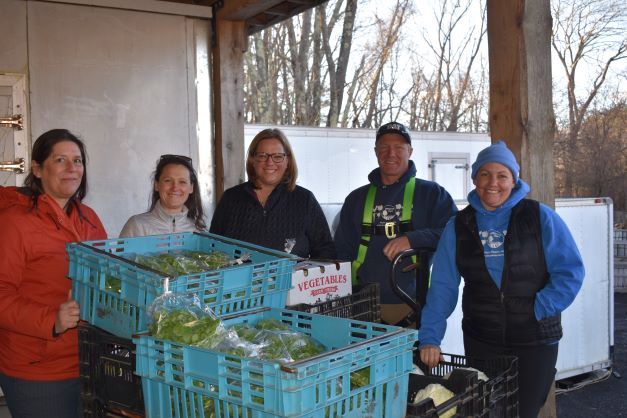On Friday, February 18, SEMAP, MDAR and Langwater Farm were excited to host USDA Undersecretary for Marketing and Regulatory Affairs Jenny Lester Moffitt for a farm visit and conversation about the Farmers Market Promotion Program (FMPP).
Though the air was chilly, spirits were high as we arrived at Langwater Farm in Easton. While farmer Kevin O’Dwyer was many feet in the air helping with construction of the new farm store, his wife and fellow farmer Kate greeted SEMAP staff and MDAR Farmer’s Market Nutrition Program Coordinator, Rebecca Davidson. Before long, US Lester Moffitt joined us to tour the farm and discuss the ways food incentive programs have helped Langwater Farm and their customers.
FMPP is a USDA grant that supports “projects that develop, coordinate and expand direct producer-to-consumer markets to help increase access to and availability of locally and regionally produced agricultural products.” Through training and support for local farms, farmers markets and other organizations, FMPP is critical to the continued use and expansion of incentive programs like the Supplemental Nutrition Assistance Program (SNAP) and Massachusetts’ Healthy Incentive Program (HIP).

As we moved from the old farm store through the greenhouses, the conversation ranged from the incentive programs and their function, to the broader impacts they have on the community, and how they support local food and growers like the O’Dwyers. Last year, SEMAP surveyed SNAP and HIP farmers, and many responded describing the benefits not just to shoppers, but to themselves. By allowing low-income families the ability to purchase fresh, local food without cutting prices, these programs increase access while also protecting small farm businesses.
The benefits of the HIP program are widespread. As Sarah Labossiere of Mass in Motion Fall River explains, “it benefits folks who need a hand up to afford healthy food, it increases sales for local farmers, it helps the local economy, and it benefits the environment by reducing pollutants related to long distance transportation of produce.” Programs like this support the entire local food community. In 2021, HIP use continued growing throughout the state, a trend that started at the beginning of the COVID-19 pandemic. According to the Department of Transitional Assistance, HIP experienced four straight million-dollar months from July through October. This past December, SNAP families used 60% more HIP incentives than they did exactly one year before in December 2020.
Langwater Farm is a great example of how important and impactful incentive programs like SNAP and HIP can be. “We love HIP here,” they told us. “On a personal level, we love that HIP does so much to make fresh, locally-grown organic veggies available to everyone in our community. We work really hard to grow good food, and we want that to be accessible to everyone, no matter what.”
Bouncing from greenhouse to greenhouse under the shadow of the soon-to-be farm store, Undersecretary Lester Moffitt asked questions about the impact of these programs, and about farming and agricultural issues in the Northeast as a whole. Before her appointment to USDA, she served in the California Department of Food and Agriculture for six years. Prior to this, she had managed her family’s walnut farm. While her experience with agriculture is extensive, the O’Dwyer’s helped to offer a perspective on what makes farming in Southern Massachusetts unique, challenging and rewarding.
Incentive programs like HIP also provide a great business opportunity for farmers as well. “At the start of Covid, we began opening one day a week in the winter to help keep local food available in our community, and to provide our crew with a more steady, reliable work schedule,” they said. The impact of these programs was immediately clear. “We were surprised at how robust HIP sales are during these winter months, and those strong sales were definitely a factor in the decision to keep going with this new winter schedule again this year.”

Other incentive programs in the state have a similar value to consumers and farmers. According to Sarah Labossiere, “The Farmers Market Nutrition Program, which supplies coupon vouchers to both WIC recipients as well as income eligible seniors, is also a fantastic program that draws folks into the farmers markets who might not otherwise venture there to buy produce.”
Farmers across our region accept different incentive programs, all seeking to provide the same support for low-income and food insecure families. At Oakdale Farms in Rehoboth, Laura Smith sees the benefit in these programs for her farm and her neighbors. “The FMNP and HIP food incentive programs have a major impact on my farm business. Without those programs, my sales would dramatically decrease, and my farm would not be able to continue to be in business.” Beyond the impact on her own farm, enabling shoppers to buy fresh, local food who might not otherwise is her motivation.
“What gets me through the long hard days of farming is the impact they have on my customers,” Smith says. “Shopping at farmers’ markets can be considered a luxury. Consumers want to be able to buy fresh fruits and vegetables to serve to their families because they know it tastes great and is healthier. Moms-to-be and seniors want to eat healthily. Families with little ones want to introduce the kids to eat veggies while they are young.”
Undersecretary Lester Moffitt was appointed to her position by President Biden in August of 2021. She was confirmed in October of last year, and now plays an important role in supporting the promotion and use of these incentive programs and others like them. As the air grew colder and the sun began to dip, the Undersecretary said goodbye, but not before we could invite her to return to the region later in the year to see what a Massachusetts farm looks like in-season, or to maybe wade into a cranberry bog with us.

